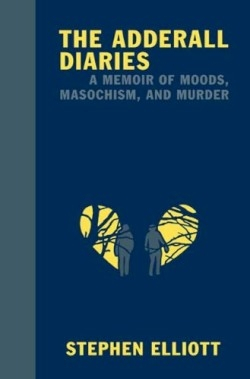The Adderall Diaries
A Memoir of Moods, Masochism, and Murder
Once one has mastered the rules of an artistic discipline, it becomes possible for a gifted few to transcend them. In The Adderall Diaries, author Stephen Elliott shatters the strictures of conventional writing to create a poignant chronicle that remains with the reader long after he or she has finished the work. It is edgy, erratic, often disheartening, yet absolutely riveting. As the author himself states, “to write about oneself honestly one has to admit a certain inconsistency and randomness that would never be tolerated in even the best of novels.”
Like Adderall, the Schedule D amphetamine to which the author was addicted and which lends the book its name, this story will not let you break free once you fall into it. Elliot’s creativity, insight, and pure artistry rewards readers who brave the disturbing subject matter.
In some ways a real-life version of John O’Brien’s heartrending Leaving Las Vegas, Elliot’s book was supposed to have been a true-crime drama, but it morphed into an autobiography along the way. The backdrop is the nearly six-month-long trial of Hans Reiser, a brilliant but curmudgeonly Linux programmer, who was accused of killing his estranged wife Nina. Despite the efforts of his respected attorney, Hans’ narcissistic personality, peculiar behavior, and condescending manner undermine his case before the jury. The proceedings take a bizarre twist when Sean Sturgeon, Nina’s former lover and Hans’ closest friend, enters the picture. A BDSM (bondage and discipline, sadism masochism) aficionado who traveled in the same twisted circles as Elliot before becoming a born-again Christian, Sean not only confessed to seven or eight unrelated murders but also, according to Hans, played a considerable role in Nina’s disappearance as well. As the trial began, her body had not been found.
Regarding Sturgeon, the author relates, “I’ve heard of him digging a knife in his own arm, carving RAGE, or standing naked in the middle of a room while several women strike at him with leather straps, his blood pooling at his feet. But, that was before he became a Christian. Now he goes to church every week, volunteers at the soup kitchen on week-ends…I’m sitting across from a man who may be a murderer, but I can’t tell.” In an extraordinary coincidence, Elliot’s own father also confessed to a murder in his memoirs that he may or may not have committed. Unlike fiction, truth really does not always have to make sense.
The truth of Elliot’s life is that it has been crammed with heartbreak and misfortune. Tortured by a father who beat and intimidated him, as a youth he watched his mother slowly die from multiple sclerosis; he emptied her urine bucket as she lay atrophied upon the couch too weak to care. After she passed on, Elliot ran away. Shuffling between group homes, he lost four close childhood friends to overdose or suicide in the space of six years. Ultimately he found release in drugs and violent sex, working as a stripper, a drug dealer, a professor, and a writer, among other things. While these experiences are nearly as painful to read as they must have been to endure, he has learned to transcend his anguish to write about relationships, love, and loss with brilliant, memorable prose. One sentence alone makes for a poignant example: “But I don’t know about Mike yet, the taste of gun like a mouthful of coins, his wife, five months pregnant with a second child, stopping in front of the door with no idea what awaits her inside.”
Stephen Elliot is the author of seven books, including the critically acclaimed novel Happy Baby. His writing has been featured in mainstream magazines such as Esquire and GQ, and newspapers like the New York Times, as well as unconventional publications such as The Best American Erotica and Best Sex Writing. A guy who intimately understands depression, addiction, and life’s bitter challenges, he tackles thorny subjects in interesting, meaningful, and ultimately enlightening ways. His newest work, The Adderall Diaries, is an unforgettable read.
Reviewed by
Lawrence Kane
Disclosure: This article is not an endorsement, but a review. The publisher of this book provided free copies of the book to have their book reviewed by a professional reviewer. No fee was paid by the publisher for this review. Foreword Reviews only recommends books that we love. Foreword Magazine, Inc. is disclosing this in accordance with the Federal Trade Commission’s 16 CFR, Part 255.

